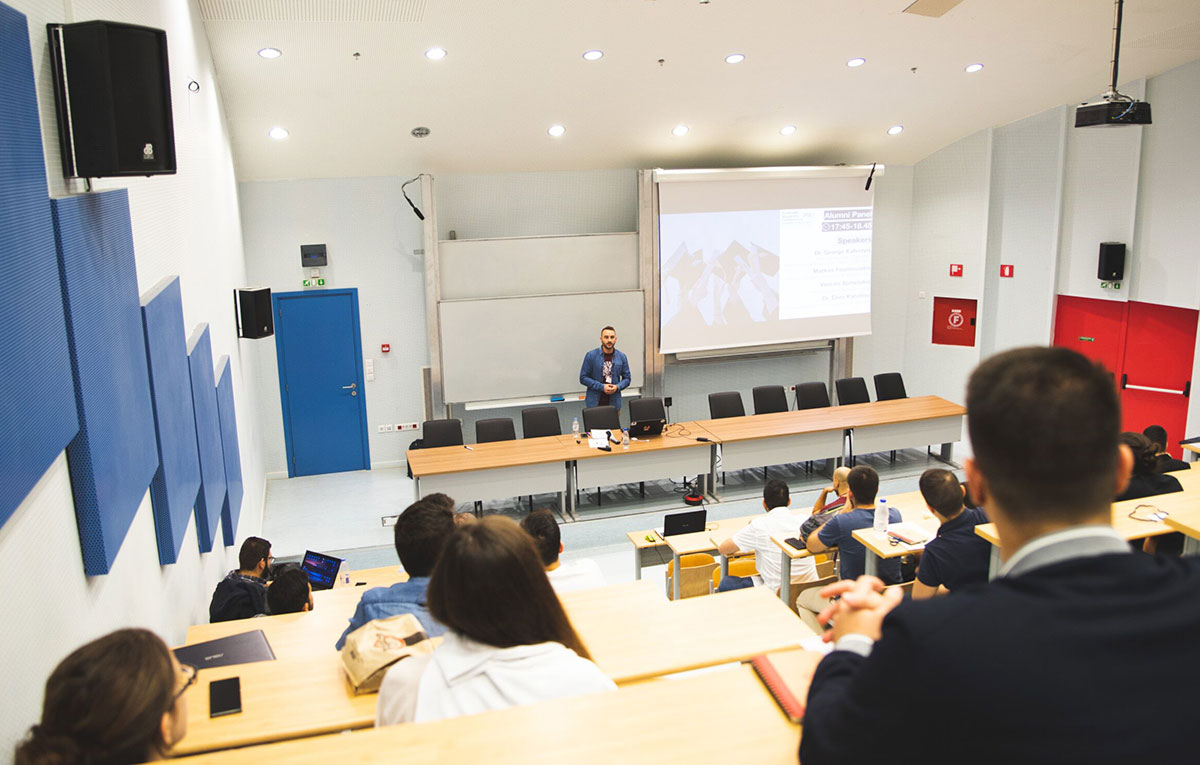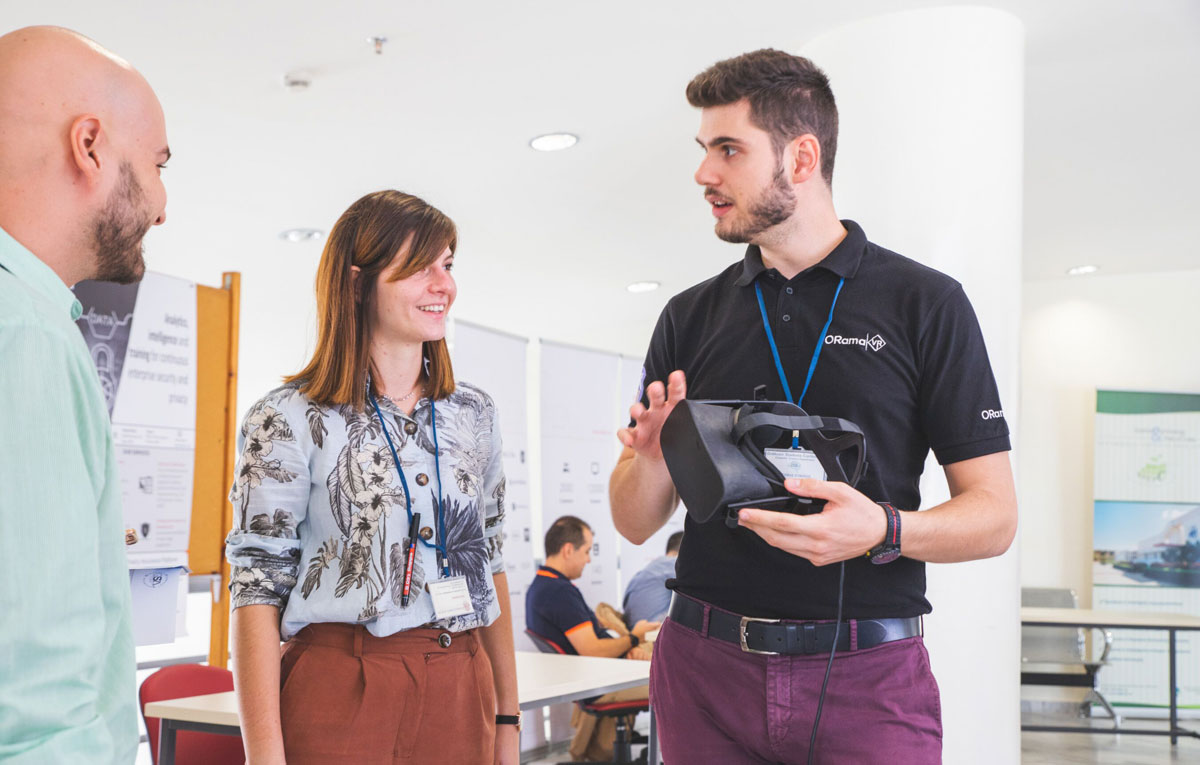Computer Science Career paths with Manos Pavlidakis
As we’ve mentioned before, here in our blog, Starttech’s roots back to the Computer Science Department (CSD) of Crete. That’s why almost a month ago, we visited Heraklion to take part in an awesome event: the 1st CSD Graduate Students Conference. That gave us the opportunity to plump the depths of Computer Science career paths.

This time, we got a chance to have an in-depth discussion with one of the members of the organizing committee. Manos Pavlidakis, Ph.D candidate at the Computer Science Department, University of Crete. He was running all the procedures of the Conference regarding companies, and gave us all the details of his Association’s initiatives.
In particular, we had a discussion on their efforts to make experience-transfer within the community a priority, post-Conference highlights. Computer science career options, as a topic, is definitely a burning issue of discussion within the (undergraduate) computer science community. We didn’t miss the chance to ask Manos’ opinion on this topic, too.
Here’s what he shared with us, regarding his Association’s role in Graduates’ computer science career paths and a few relevant topics:
Computer Science career choices and opportunities
Q1: Tell us afew things about your initiatives, in general. How exactly does your Students Association help Graduates and Undergraduate students in their future career?
A1: The Graduate Student Association of CSD, UoC organizes events, in order to prepare the CSD students for their next steps after graduation. At GSC19 students were able to prepare themselves, either for research or the industry. In particular, students communicated with companies, researchers, and entrepreneurs. There were sessions, such as “prepare your next steps” during which students were informed on how to build a CV and how to create a startup. Moreover, the alumni and researchers panels, informed students about their experiences after graduation. All in all, students get prepared for their vocational habilitation, by taking part in talks from experts and communicating with companies.
Q2: How do student associations abroad help students, as far as you are concerned? Do you plan to take respective actions, in helping your Association’s members further?
A2: There are many ways student associations abroad help students. Although it depends on the country and university, all of them try to bring students closer by organizing (or co-organizing) different type of activities or events. Since the goal of these activities/events is to build a stronger community among students, they do not necessarily involve topics around Computer Science. Such events/activities are: conferences, computer science career days, trips to other academic/research institutions/facilities, sports, movies etc.
We would like to expand our actions further to engage more students by covering the different needs that they have. For example, an idea would be to contact other institutions and build a channel of communication among them and our students; both for feedback regarding a particular field, and also possible job openings/positions.
Q3: Do you believe that creating a direct channel to the market is really important for graduate students, to be properly absorbed? If so, how successful has this effort been up till now?
A3: It is important, considering the difficulties in finding a job at this day and age. Graduate Students Conference of CSD 2019 was the first step toward this direction. It is apparent, from the feedback we’ve received, that both the companies and the participants of the conference enjoyed the booth session, which shows a tendency for our effort so far. Of course, there are many more things to consider and ideas of events/activities to organize, in order to establish a direct channel to the market.
Q4: How valuable is experience transfer from former students (Alumni) — now professionals — to younger ones? And how does networking, in general, affect one’s career?
A4: It is quite valuable, considering the fact that alumni have acquired the experience to overcome different types of obstacles, during their career after their CSD student life. By sharing their experience, they can help current students understand what they will probably face in the future; and ensure them that CSD provides them all the necessary supplies and tools required to succeed in their future; whether it is in academia or in the industry.
Q5: We’ve seen that part of your conference was devoted on how to build your startup. Tell us a few things about it. Have you seen a significant change on that part? Is entrepreneurship an attractive computer science career path for your Department’s Graduates to follow?
A5: That’s right. As part of the session “Plan your next steps” and more specifically the talk “Do you have a business idea? The Lean Way for taking it off!” the participants were able to hear the importance of going after their business idea, no matter the obstacles; and to understand the main things necessary to succeed.
To the best of our knowledge, not many graduate students of CSD choose an entrepreneurial path over others. This information is not verified nor documented, but we believe it is valid. That’s because, in general, not many students have experience in startups. Further investigation on this particular case is required in order to have a better understanding on that matter.
Q6: Is there a way for students to get a glimpse of what works best for them in established markets, during the course of their studies? Is the educational system in-sync enough to allow them for adjustments in syllabus, or curriculum even? (And do Associations help, for that matter?)
A6: Yes, there is some, but we can do better. Students can do an internship (which, in some fields in other countries, is compulsory for students) directly with a company or through Erasmus. By doing so, they can experience first hand what is like to work in established markets. However, there is much more that we can do. For instance in GSC19 we tried to create a meeting point between students and companies. Students interacted with companies, and learned about hot and state-of-the-art technologies. Apart from students, researchers and professors were able to interact with the companies. The outcome of this interaction can be very effective for both the curriculum and the educational system.
Q7: What are your Association’s future plans?
A7: As mentioned before, we would like to expand our process of building a stronger community, which was the theme of GSC19. We would like to organize or co-organize activities and events that will engage more students. Currently, we are into discussions about organizing a career day or couple of days. But of course there are many other ideas on the table.
Until next time
We would like to thank Manos for our insightful discussion. Without a doubt, it offered us a lot of insight and was an opportunity that gave us food for thought. We wish all the best to his association. And we hope that all computer science graduates will have a brilliant and promising future. On our part, we’ll try to do our best to be part of any future initiatives to follow. And we promise to heartily support this community, in any way we can.

